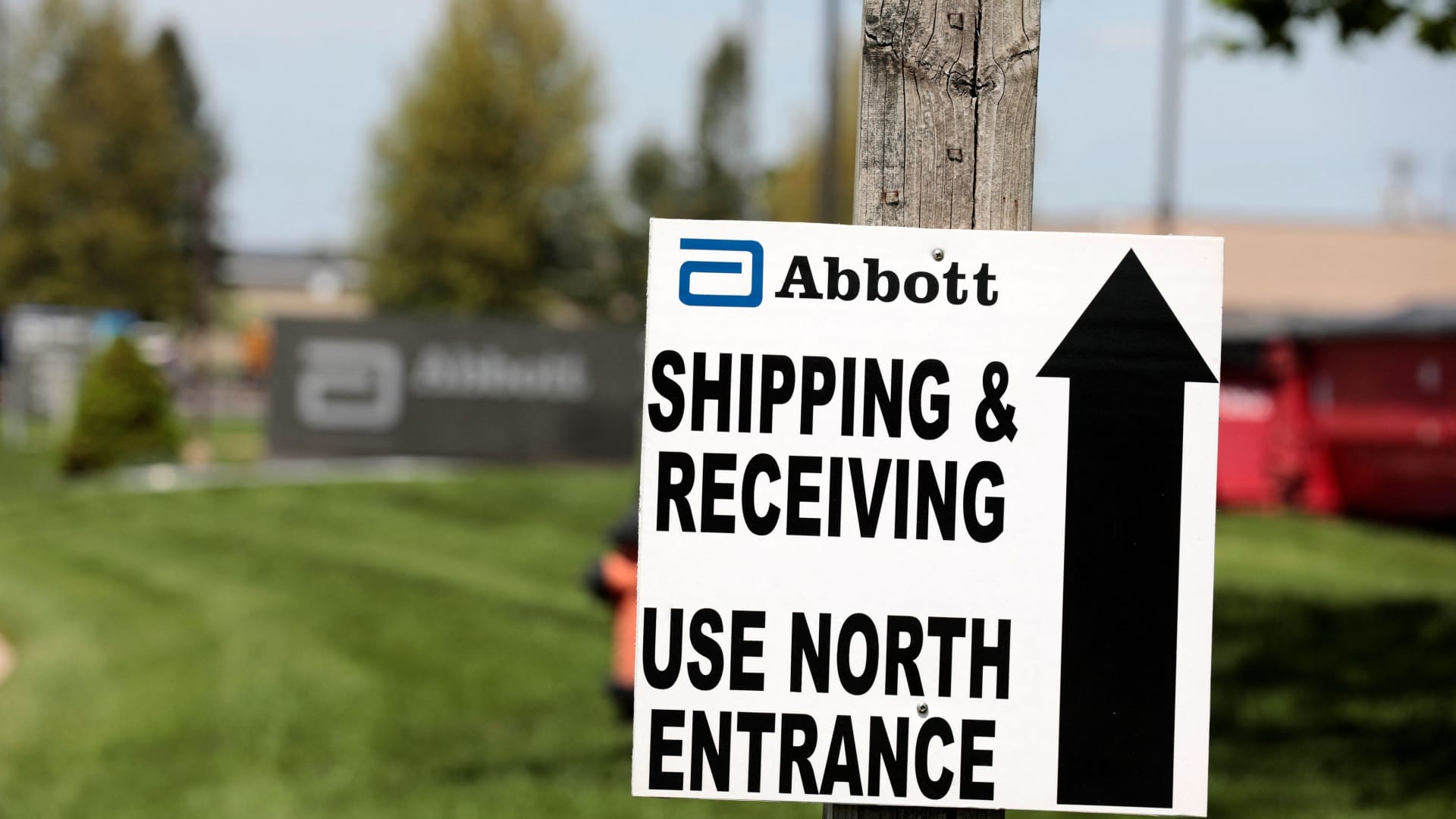
Dr. Robert Califf testifies during his nomination hearing before the Senate Health, Education, Labor and Pensions Committee November 17, 2015 in Washington, DC.
- Food and Drug Administration Commissioner Robert Califf said inspections found "shocking" conditions at Abbott's infant formula plant in Michigan.
- Califf said Abbott CEO Robert Ford told him the plant could resume production in early June, but the facility has to implement hundreds of steps before it can reopen to ensure food safety.
- The FDA commissioner also said an investigation couldn't conclude that unsanitary conditions led to four infants falling ill, two of whom died, but he called the confluence of events "highly unusual."
Food and Drug Administration Commissioner Robert Califf gave a scathing review of "egregiously unsanitary" conditions at Abbott's baby formula plant in Michigan during sworn testimony before a House subcommittee about the baby formula shortage on Wednesday.
Califf described bacteria growing from multiple sites in the facility, cracks in key equipment, leaks from the roof, standing water and a previous citation for inadequate handwashing.
Get Tri-state area news delivered to your inbox. Sign up for NBC New York's News Headlines newsletter.
"Frankly, the inspection results were shocking," Califf told House lawmakers on the Oversight and Investigations subcommittee. "This is so far removed from my previous experience with the company that I am very concerned."
Abbott closed its Sturgis, Michigan, plant and recalled multiple baby formula products in February, after the FDA found five different strains of Cronobacter at the facility. Cronobacter is a bacteria that can cause dangerous blood infections. Four infants who consumed powdered formula from the Abbott plant fell ill and were hospitalized with Cronobacter infections, two of whom died.
Money Report
Califf said the FDA and the Centers for Disease Control and Prevention's investigation couldn't conclude that the insanitary conditions at the plant caused the illness. However, he said the health agencies cannot rule it out either, calling the confluence of events "highly unusual." None of the Cronobacter strains at the Sturgis plant matched two clinical samples from the ill infants, according to the FDA.
Four manufacturers — Abbott, Mead Johnson Nutrition, Nestle USA and Perrigo — control 90% of the domestic infant formula market in the U.S. Abbott had a 40% market share in the U.S. before the recall, and its Michigan facility made up 40% of the company's U.S. formula production.
Executives from Abbott, Nestle-owned Gerber and Mead Johnson's parent company Reckitt told lawmakers that the Covid pandemic had already strained infant formula supply chains and shortages had begun in 2021 as parents started stocking up on formula. However, the closure of Abbott's plant and the recall this year tipped the shortages into a crisis. Califf said reports of shortages began to spread about a month ago as parents started stocking up on formula in response to the recall to ensure they had adequate supply at home.

Califf said Abbott CEO Robert Ford assured him on Tuesday that the Michigan plant would be ready to resume production in early June. Califf said the plant is not ready now because conditions at the facility were so bad that Abbott is required to complete hundreds of steps to come into compliance with food safety laws under a consent degree subject to enforcement by the Justice Department and a federal court.
"Abbott's enormous market share left it with a responsibility for producing safe infant formula that wasn't met," Califf said. "We will do everything in our power to work with Abbott to make this happen as quickly and safely as possible, but this timing is in Abbott's control."
Abbott executive Christopher Calamari, who heads the company's U.S. nutrition division, told lawmakers the 700,000-square-foot Michigan facility is undergoing testing, cleaning and validation to make sure quality-control checks are in place so the plant can safely resume production. Calamari said the plant is also installing new flooring that is easy to clean and keeps moisture out. Employees are also undergoing training to make sure bacteria does not grow in the plant again, he said.
When asked whether anyone would be fired over the plant's conditions, Calamari said there's an open investigation into allegations raised in a whistleblower complaint filed with the FDA in October 2021 that raised concerns about regulatory violations and lax practices. Calamari said he did not become aware of the whistleblower report until April when it was made public by Congress and pushed back on the allegations, saying they have not been proven true.
The FDA, in its written testimony, said hard copies of the whistleblower report were not forwarded from the mail room to leadership. The agency's acting commissioner at the time, Dr. Janet Woodcock, first received a copy via email in February. The FDA's deputy commissioner for food policy and response, Frank Yiannas, also told the committee that he did not receive the whistleblower report until February.
"I'm not sure why the report wasn't shared with me and how it didn't get escalated," said Yiannas.
Califf faced a grilling from lawmakers about why it took months for the FDA to inspect the Abbott plant. The FDA first learned in September of an infant with Cronobacter infection who consumed powdered formula from the Abbott plant, and the agency received a whistleblower complaint about food safety violations at the plant in October. However, the FDA did not initiate inspections at the plant until January.
Califf acknowledged that it took too long for the FDA to conduct inspections, but said he has found no evidence of intentional delay or malfeasance at the agency. The FDA reported the September case to Abbott and tested formula associated with the case but did not find Cronobacter contamination, according to Califf's testimony. The agency learned of another infant infected with Cronobacter who consumed formula in December, but again didn't find Cronobacter in the product.
The FDA, in its written testimony, said it originally planned to begin inspections in December, but decided to delay the process after a dozen employees at the plant tested positive for Covid.
Rep. Diana DeGette, chair of the subcommittee, said the FDA's food safety oversight has only half the resources of its drug division. The House passed legislation that would give the FDA $28 million in emergency funding to increase inspections among other measures, but the bill still has to pass in the narrowly divided Senate.
Califf said the FDA has repeatedly requested the authority to implement an early warning system for when there are shortages of critical products such as baby formula, but that would require congressional authorization and industry has opposed it.
"There's no reason we don't put together a national system to enable us to do stress testing on the supply chain for critical products like this just like we have with banks," Califf said.
The FDA commissioner said actions taken by the FDA and the Biden administration should result in an infant formula surplus in the U.S. in the next few weeks, though he did not provide more specific timing. The FDA has eased import restrictions to bring in formula from abroad, and the U.S. is using military aircraft to fly the product in.
"This is a war mentality. It is a crisis. We are fully aware of it. Families should not be searching for formula, but they have to do it now until we fill in," Califf said.
Correction: Frank Yiannas is the deputy commissioner of food policy and response at the FDA. A previous version of this story misspelled his last name.






